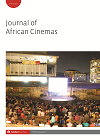- Home
- A-Z Publications
- Journal of African Cinemas
- Previous Issues
- Volume 10, Issue 3, 2018
Journal of African Cinemas - Volume 10, Issue 3, 2018
Volume 10, Issue 3, 2018
-
-
Between political and aesthetic efficacy: 40 years of audio-visual practice in lusophone Africa
More LessThis article provides an overview of the audio-visual histories in lusophone Africa – Angola, Cape Verde, Guinea-Bissau and Mozambique – since these countries’ independences. The emergence of these new nation states in 1974 and 1975 led to a strong interest in film production and thus to the ‘birth’ of these histories. I will assess them critically using the still valid idea of a necessary decolonization of the mind. Furthermore, I will discuss their transnational nature, which stems from the lack of training, production and distribution possibilities in the new nation states. Jacques Rancière’s concepts of political and aesthetic efficacy will serve as methodological tools so as to understand the dynamics of the audio-visual projects and films produced over the last four decades. Accordingly, this article’s main objective is to present and update existing studies, offering a critical outline of the lusophone African audio-visual sector between 1974 and 2015.
-
-
-
Ruy Guerra’s Mueda, Memória e Massacre: The missing images
More LessRegarded as the first fictional feature film of independent Mozambique, although this categorization only describes it inadequately, Ruy Guerra’s Mueda, Memória e Massacre (‘Mueda, Memory and Massacre’) (1979/80) documents a Makonde collective re-enactment of the Mueda Massacre (1960). Exemplifying Mozambican Liberation Aesthetics, the film was censored, partially re-shot and re-edited. The altered version aims to respond to a historiographical apparatus seeking to organize and codify Mozambican history. The censorship, partial re-shooting and re-editing tried to adapt Mueda, Memória e Massacre to the official view of the Mueda Massacre and to the emerging film canon, revealing an authoritarian ‘modernist’ paradigm. The film’s missing images create an archaeology of FRELIMO’s political and cultural programme and show the contradictions between ideology and political praxis in the late 1970s.
-
-
-
Dundo, Memória Colonial: A postcolonial return and the documentary politics of history
More LessBy Robert StockThis article presents an analysis of the documentary film Dundo, Memória Colonial (‘Dundo, colonial memory’) (2009) by the Portuguese journalist Diana Andringa. In the first section, I will inscribe Andringa’s film within the wider context of filmic geographies of return. Sections two and three address the multifaceted ways in which colonial Dundo is remembered in Portugal by former settlers and in Angola by former African workers as presented by the film. The fourth section of the article analyses a more personal memory of Dundo that is also developed in this film as the director herself spent her childhood in Dundo. I will conclude that Dundo offers fragmented visions of the past that have to be confronted and discussed in a shared Afro-Portuguese filmic framework. As nostalgic and critical ways of remembering the past are confronted in the film, the documentary proposes that remembering the past is always ambivalent and connected to specific politics of history.
-
-
-
Cape Verdean immigration in Pedro Costa’s Fontainhas trilogy: Narratives of deterritorialization
More LessBy Ana VeraThis article will focus on the narratives of space and deterritorialization in Pedro Costa’s Fontainhas trilogy. This trilogy is made up of Ossos (‘Bones’) (1997), No Quarto da Vanda (In Vanda’s Room) (2000) and Juventude em Marcha (Colossal Youth) (2006), which explore the lives and narratives of Cape Verdean immigrants and their descendants living in the famed shantytown outside Lisbon’s limits. The analysis of Pedro Costa’s trilogy will focus on Fontainhas inhabitants’ inability to possess their territory as the result of an existence shaped by a movement of perpetual deterritorialization. As I will argue, this process reflects Portugal’s failure to fulfil the promises of the Carnation Revolution, remaining inhospitable for immigrants.
-
-
-
Book Reviews
More LessAuthors: Wunpini Fatimata Mohammed and Añulika AginaSensational Movies: Video, Vision and Christianity in Ghana, Birgit Meyer (2015) California: University of California Press, 408pp, ISBN 978-0-52028-768-6, p/bk, $34.95
Nollywood: Popular Culture and Narratives of Youth Struggles in Nigeria, Paul Ugor (2016) Durham, NC: Carolina Academic Press, 188 pp., ISBN 161-1-63777-5, paperback, $29.00
-
-
-
Film Review
More LessSINK, Brett Michael Innes (2016), South Africa: Brittle Star Pictures and Times Media Films (115 min.)
-
Most Read This Month


